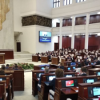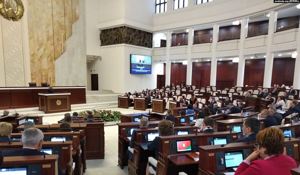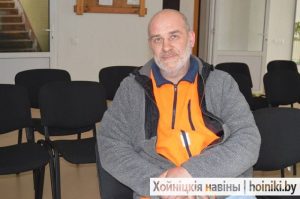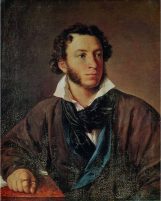Forum 18. BELARUS: Repressive draft Religion Law awaits second reading. Part 2
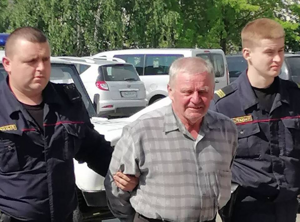
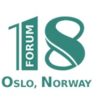
Organisation"Forum 18"
Норвежская организация, целью которой является содействие религиозной свободе.
18 October 2023
Felix Corley, Forum 18, and Olga Glace, Forum 18
Belarus’ repressive new Religion Law awaits its second reading in the regime’s non-freely elected parliament after passing its first reading on 11 October. No date has been set. The text of the draft Law as presented to parliament was made public only on about 10 October. Local human rights defenders and religious communities have criticised the Law, and three UN Special Rapporteurs have written to the regime expressing concerns that the proposed new Law “would fail to meet Belarus’ obligations under international human rights law”.
Compulsory state permission to exercise freedom of religion or belief remains
The draft Religion Law continues to require all religious communities to gain state registration before they are allowed to operate. Article 15 declares: “Religious activity in Belarus without the creation of religious organisations and their state registration is banned.” The current Law states that the only religious communities which may “unobstructed” exercise their freedom of religion and belief are state-registered religious communities within state-approved places of worship or other venues.

© Baptist Council of Churches
Any activity by unregistered or liquidated religious communities can lead to prosecution under Criminal Code Article 193-1. This punishes “organisation of or participation in activity by an unregistered political party, foundation, civil or religious organisation” with a fine or imprisonment for up to two years. Article 193-1 was removed from the Criminal Code in July 2019, but was restored almost unchanged in January 2022.
The ban on and punishment for exercising freedom of religion or belief without state permission is against international law, as outlined in the OSCE / Council of Europe Venice Commission Guidelines on the Legal Personality of Religious or Belief Communities. This notes: “State permission may not be made a condition for the exercise of the freedom of religion or belief. The freedom of religion or belief, whether manifested alone or in community with others, in public or in private, cannot be made subject to prior registration or other similar procedures, since it belongs to human beings and communities as rights holders and does not depend on official authorization.”
A member of the Council of Churches Baptists – who do not seek state permission to exercise freedom of religion or belief – insisted to Forum 18 on 12 June that their communities “will carry on doing what we do” regardless of what new Law is adopted.
On 2 June, a judge fined Council of Churches Baptist Vladimir Burshtyn – who is in his 70s – over a month’s average pension for an outdoor meeting in Drogichin with fellow Baptists to share their faith.
Compulsory re-registration requirement
Article 4 of the draft Religion Law requires all registered religious communities to bring their statutes into line with the provisions of the new Law and apply for re-registration within one year of the Law entering legal force or to close down. It appears that if religious communities fail to get the compulsory re-registration, all their activity would become illegal.
Compulsory re-registration linked with denials of communities’ existing legal status is illegal under international law. As the OSCE / Council of Europe Venice Commission Guidelines on the Legal Personality of Religious or Belief Communities note: “In cases where new provisions to the system governing access to legal personality of religious or belief communities are introduced, adequate transition rules should guarantee the rights of existing communities. Where laws operate retroactively .. (for example, requiring reapplication for legal personality status under newly-introduced criteria), the state is under a duty to show that such restrictions are compliant with the criteria set out in Part I of these Guidelines.”
(The Guidelines’ Part 1 outlines the permissible restrictions on the freedom of religion or belief, including that “limitations may not be retroactively or arbitrarily imposed on specific individuals or groups; neither may they be imposed by rules that purport to be laws, but which are so vague that they do not give fair notice of what the law requires or which allow for arbitrary enforcement”.)
The Guidelines go on to note that “the state must demonstrate the objective reasons that would justify a change in existing legislation, and show that the proposed legislation does not interfere with the freedom of religion or belief more than is strictly necessary in light of those objective reasons”.
Religious communities are the second group of organisations (after political parties, which had to apply to be re-registered by June 2023) that are being required to undergo “total re-registration”, Lawtrend Centre for Legal Transformation pointed out. Political parties also had to apply for re-registration within one year.
After the 2002 Religion Law was adopted, religious communities were given two years until November 2004 to undergo compulsory re-registration. The regime at that time obstructed many religious communities’ attempts to seek state registration.
As of 1 January 2023, according to the Plenipotentiary’s Office, 3,590 religious communities had state registration, 3,417 individual communities and 173 larger communities.
Almost every religious leader Forum 18 spoke to pointed out that many religious communities will face problems with re-registration. Exiled Orthodox priest Fr Aleksandr Shramko fears that when religious communities apply for re-registration, “those objectionable to the authorities may not get through”.
“Our community in Minsk which is in the process of registration might have a problem as it is not numerous and it is difficult to find more members,” the head of the Lutheran community in Grodno Igor Grigus told Forum 18.
The leader of the Religious Board of Muslims in Belarus, Ali Voronovich, commented that in many places it may be impossible to find the required number of members to register a community. “Many communities in villages and small towns will cease to exist, and it does not concern only Muslim communities,” he told Forum 18 on 8 June.
The member of the Church of Jesus Christ of Latter-day Saints also expressed concern about registration provisions. “It might be a problem not only for us.”
Even tighter registration restrictions
Article 12 of the draft Religion Law continues to require leaders of registered religious communities to be Belarusian citizens, but adds that they must also be permanent residents of Belarus.
Individuals who are on either the “List of organisations and individuals involved in terrorist activities” or the “List of citizens of the Republic of Belarus, foreign citizens or stateless persons involved in extremist activities” would be banned from being leaders or founders of registered religious organisations.
The regime maintains multiple similar lists targeting anyone, any organisation, any document, any communication, or any website the regime dislikes, such as the “Republican List of Extremist Materials” (see below).
Article 15 requires registered religious organisations to notify the registering authority of the appointment of a new leader within 10 days. Depending on the type of religious community (eg. national religious organisations, monasteries, etc.), the registering authority is either the Plenipotentiary’s Office or local administrations.
Article 13 specifies that religious communities (the lowest level of registered religious organisation) are allowed to operate only in the place of their registration.
Under Article 16, religious communities have to supply with a registration application not only their statute, but a certificate confirming a place to conduct their activity (which can be difficult in small towns and villages). They also need to submit a list of the 20 or more adult founding members who live in one locality or neighbouring localities, with each person’s date of birth, citizenship, address, place of work or study, phone number and signature.
Many people are reluctant to provide such information to a regime which commits serious human rights violations against the people it rules. The requirement for 20 founder members will also prevent many smaller or rural religious communities from gaining registration.
As the OSCE / Council of Europe Venice Commission Guidelines on the Legal Personality of Religious or Belief Communities note: “Any procedure that provides religious or belief communities with access to legal personality status should not set burdensome requirements. Examples of burdensome requirements that are not justified under international law include, but are not limited to, the following: that the registration application be signed by all members of the religious organization and contain their full names, dates of birth and places of residence.”
The Guidelines also state that: “legislation should not make obtaining legal personality contingent on a religious or belief community having an excessive minimum number of members”.
The draft Religion Law does not refer to a possibility for religious communities which have fewer than the required 20 locally-resident adult citizen members to lodge a registration application.
Religious communities have to in their registration application provide extensive extra information if they were “previously unknown in Belarus”. This would include the origin and “worship practice” of their faith, as well as their attitude to the family and marriage, the health of their followers, and the “carrying out of state obligations”. Applications from such communities would be sent to the Plenipotentiary’s Office for a religious studies “expert analysis”, which could last up to six months.
The UN Human Rights Committee’s General Comment 22 on Article 18 (“Freedom of thought, conscience and religion”) of the ICCPR states that the Committee “views with concern any tendency to discriminate against any religion or belief for any reasons, including the fact that they are newly established.”
The OSCE / Council of Europe Venice Commission Guidelines on the Legal Personality of Religious or Belief Communities note: “The state must respect the autonomy of religious or belief communities when fulfilling its obligation to provide them with access to legal personality. .. states should observe their obligations by ensuring that national law leaves it to the religious or belief community itself to decide on .. the substantive content of its beliefs .. In particular, the state should refrain from a substantive as opposed to a formal review of the statute and character of a religious organization.”
Higher level organisations are divided into national and regional religious communities, which both require registration by the Plenipotentiary’s Office.
Article 14 of the draft Religion Law requires national religious communities to have at least 15 member communities in all seven regions of the country (compared to 10 in the current Law), at least one of which had had state registration for at least 30 years. In his June justification for the Law, Plenipotentiary Rumak states that an aim of the new Law is to change the registration procedure “limiting through this the possibility to create a nationwide registered religious organisation”. He did not explain why the state aims to limit the number of communities eligible to apply for national religious organisation status.
This parallels the 2023 Political Parties and other Public Associations Law, which makes it significantly harder to form such groups, especially nationwide.
Regional religious communities have to have at least 10 religious communities in one or several neighbouring regions, at least one of which had had state registration for at least 30 years.
Only national or regional organisations would have the right to found monasteries, missions and religious educational establishments, which would themselves require state registration.
“Extremism”
The draft Law makes wide use of the term “extremist”, a term widely used in other laws, as banned Belarusian human rights group Human Constanta noted on 5 June, along with international human rights groups Access Now, Article 19, and the World Organisation Against Torture (OMCT).
“The corpus of Belarusian ‘anti-extremism’ laws lacks sufficient precision and grants the authorities unfettered discretion to restrict the freedom of expression and other human rights,” the human rights groups noted in a submission to the UN Special Rapporteur on the Situation of Human Rights in Belarus, Anaïs Marin.
Fionnuala Ní Aoláin, UN Special Rapporteur on the promotion and protection of human rights and fundamental freedoms while countering terrorism, noted in her January 2020 report (A/HRC/43/46/Add.1) after visiting Kazakhstan: “the counter-terrorism and extremism regimes provide excessive leeway to the authorities to target and silence those who peacefully question the established order, including various civil society actors, human rights defenders, trade unionists, journalists, bloggers, and members of marginalized communities or of communities legitimately exercising their religious freedoms. The overwhelming focus on extremism has no justification under international law.”
Ní Aoláin’s February 2020 general report on Human rights impact of policies and practices aimed at preventing and countering violent extremism (A/HRC43/46) repeated this point, stating that all “States that regulate ‘extremism’ in their laws, policy, programmes or practice should repeal such provisions, which have no purchase in international law, and domestic law must comply with the principles of legality, necessity and proportionality.”
The regime labels an extraordinarily wide range of activity as “extremist”. Human Constanta regularly documents such cases, including its most recent April – June 2023 overview. It noted earlier in 2023 the jailing of the administrator of a social media group for three years for distributing educational information about the Belarusian language.
Among such cases, a Greek Catholic news website and a YouTube interview with a Catholic priest who fled to neighbouring Poland in 2021 to escape prosecution are among religious items banned by local courts as “extremist” in late 2022 and added to the Information Ministry’s “Republican List of Extremist Materials”.
In autumn 2023, courts have declared materials from Christian Vision and Minsk’s New Life Church “extremist”.
Christian Vision expressed concern about the growing list of websites, channels and social networks of religious figures and communities courts have declared “extremist”. “This is done in order to artificially create obstacles to the dissemination of this information, limit its receipt by people who are in Belarus.” Christian Vision pointed out in a 21 September report that even a link on a mobile phone “becomes a reason for persecution of a person who is interested in obtaining independent and important information that concerns Christianity and the modern political crisis”.
“The authorities are thus trying to reduce the influence of religious leaders, activists and communities commenting on events in Belarus and repressions committed against believers and their communities,” Christian Vision noted.
Deputy Information Minister Igor Buzovsky, who is also Deputy Chair of the “Republican Expert Commission for the Evaluation of Symbols, Attributes, and Information Products for the presence (or absence) in them of signs of Extremism”, insisted to Forum 18 in January 2023 that “This is done exclusively on the basis of the law.”
However, Deputy Information Minister Buzovsky refused to discuss the banning of the Tsarkva Greek Catholic website or other religious publications. “You speak about one website – I wouldn’t want to talk from memory. You need to apply officially.” He refused to discuss anything else about why religious publications are banned and put the phone down.
New powers for regime to inspect and monitor religious communities
There is currently surveillance by the KGB secret police of religious believers, along with monitoring of and restrictions on religious communities by the Plenipotentiary for Religious and Ethnic Affairs and other state agencies.
Article 40 of the draft Religion Law continues explicit state surveillance of whether registered religious communities are abiding by the law. Such control would continue to be enacted by the Plenipotentiary’s Office and local administrations.
(Provisions in Article 40 of the June draft of the Law which would have required local administrations to establish commissions to check whether religious communities are abiding by the law, allowed officials to demand any documents they wished to see and “sending its representatives to be present at events, religious rites or in religious Sunday schools conducted by religious organisations” do not appear in the version of the draft Law now in parliament.)
Article 26 of the draft Religion Law bans missionary activity and materials “contradicting the law and the ideology of the Belarusian state”. The “ideology of the Belarusian state” is not explained.
In his June justification for the Law, Plenipotentiary Rumak says that the new Law would “strengthen the rights for registering bodies [the Plenipotentiary’s Office and local administrations] to inspect the activity of religious communities under their statutes” to determine whether it is accord with the Religion Law. Rumak notes that the new Law would widen religious communities’ responsibility for violations of the Law, including over “carrying out extremist activity and attempts to revive Nazism, or illegal missionary activity”.
Greater “legal” possibilities for state to forcibly close religious communities
Under Article 41 of the draft Religion Law, a failure to correct a “violation” within six months or a repeated “violation” within a year continues to allow officials to go to court to liquidate (in effect ban) a religious community. Even before any court liquidation hearing, officials could suspend the religious community’s activity which would make anything it did illegal. Such a suspension cannot be legally challenged.
In his June justification for the Law, Plenipotentiary Rumak stressed the widening of the possibility for the state to liquidate registered religious communities and thus render any activity by them illegal. He says the new draft takes into account cases of such liquidations:
– “for the failure of their activity to be in accord with the basic directions of internal and external policy, the conception of national security,
– the failure to provide reports on multiple occasions (twice or more) within the established timeframe on changes in data which should be entered in the State Register of Religious Organisations,
– the failure to eliminate within six months violations which have led to a written warning,
– or the committing of repeated violations within a year of the issuing of such a warning.”
(Article 43 of the June draft of the Law specifying that violations of the Religion Law would continue to lead to punishment does not appear in the draft Law now in parliament. This would have specified a far wider range of activities that would lead to punishment than in the current Law. These would have included “carrying out extremist activity and activity directed at the rehabilitation of Nazism”, as well as “carrying out missionary activity with violations of the demands set out in the present Law”.)
Plenipotentiary Rumak’s June justification for the Law stated that various other laws would need to be changed if the new Religion Law is adopted. However, he did not name among these laws either the Criminal Code or the Administrative Code. The draft Law now in parliament does not include any changes to the Criminal Code or the Administrative Code, only to the Civil Code.
Continuing restrictions on religious literature, items
Article 22 of the draft Religion Law gives the Plenipotentiary the right to commission a religious studies “expert analysis” of any religious literature or items “with the aim of preventing the distribution of religious literature or other materials containing information inciting ethnic, religious or racial hatred and other extremist manifestations”. Cultural or educational organisations receiving religious books can seek an “expert analysis” from the Plenipotentiary.
This largely continues the existing compulsory prior state censorship of and restrictions on the distribution of most religious literature and objects, which runs in parallel with the threat of banning texts or websites as allegedly “extremist”.
(A new provision in the June draft of the Law which would have banned educational establishments from including religious literature in their libraries is not in the draft Law now in parliament. Under the current Religion Law, educational establishments can put religious books in their libraries if they have undergone censorship by the Plenipotentiary’s Office.)
Article 27 of the draft Religion Law allows only registered religious organisations to produce, import, export or distribute “religious literature, other printed, audio- and video-materials, as well as other objects of religious significance”. The Council of Ministers draws up a list of such “objects of religious significance”.
Religious literature, audio and video materials “must not contradict the ideology of the Belarusian state” or contain “propaganda of war, social, ethnic, religious or racial hatred and other extremist activity”. The “ideology of the Belarusian state” is not explained.
As at present, under Article 27 of the draft Religion Law religious communities have to present all imported religious literature or materials “for conducting missionary and other non-cult activity” to the Plenipotentiary’s Office for it to decide whether to commission a religious studies “expert analysis”. All such literature or materials continue to be required to include the full name of the registered religious and its religious affiliation.
Only religious communities continue to be allowed to distribute printed, audio and video materials on religion and continue to be allowed to do so only on their premises or, if they get permission from local administrations, in other premises.
The Catholic Bishops’ Conference earlier commented that these restrictions on distribution “put religious literature in a discriminatory position compared to other literature that can be distributed through specialised bookshops”.
Commercial organisations continue to be banned from publishing religious literature or from producing items to be used in religious worship.
Religious education to be restricted, under regime surveillance
Article 10 of the draft Religion Law imposes new restrictions on religious education of children and adults. Registered religious communities could provide such education only if it is in their statutes and only in premises they own or rent, unless those rented premises are owned by educational establishments, or organisations and business people providing education.
“This could put in a difficult position both rural parishes and recently-formed urban communities building their own buildings in new urban areas,” 15 June comments signed by “Grodno Diocese of the Belarusian Orthodox Church” below the draft Law on the government’s legal website note.
The religious education of adults, young people, and children, as well as related materials, must not “contradict the ideology of generally accepted traditional values of the Belarusian people or the ideology of the Belarusian state” or “contain propaganda of war, social, ethnic or religious hatred”. Neither “the ideology of generally accepted traditional values of the Belarusian people” nor “the ideology of the Belarusian state” is explained.
Children could take part in these classes only with a signed application from parents or guardians.
Religious communities are required in their religious education to “cooperate” with local and other state authorities.
(A provision in the June draft of the Law which would have required religious organisations to report to the authorities where they are registered by 31 October each year on “the religious education of children attending religious Sunday schools” in the form to be prescribed by the Education Ministry and the Plenipotentiary is not in the draft Law now in parliament.)
The provisions covering religious education in the proposed new Law “reveal the regime’s wariness towards any uncontrolled influence on minds, especially of the youth”, exiled Orthodox priest Fr Shramko noted.
The Catholic Bishops’ Conference expressed concern that applications from parents or guardians for children to attend religion classes held by religious communities, could be subject to inspection by officials. “An obligation could be placed in future on religious communities to provide the controlling agencies lists of named children who are studying, with the attached applications from parents,” it noted. This would force parents and children to reveal any religious affiliation, it added, which is illegal under international human rights law.
As the UN Human Rights Committee’s General Comment 22 on ICCPR Article 18 (“Freedom of thought, conscience and religion”) states: “No one can be compelled to reveal his thoughts or adherence to a religion or belief.”
Fr Yuri Sanko, the spokesperson for the Catholic Bishops’ Conference, told Forum 18 on 13 June that officials – mainly from local Executive Committees – have already demanded to know how many children are studying in religious education classes, but have not so far demanded the names of those children or their parents.
Regime inspections of Catholic parishes took place from March 2021, sometimes followed by prosecutions of priests. Prosecutors, as well as officials from local Ideology Departments at the request of prosecutors, demanded reports from priests, catechetical plans and other internal information about parish life.
Under Article 10 of the draft Religion Law, religious education of children and adults has to be in the state languages (Belarusian or Russian). The Catholic Bishops’ Conference points out that as Belarus is a multi-ethnic state, this provision would deny ethnic minorities the right to teach their faith in their native language.
Separating religious communities from involvement with wider society
Neither the draft Law nor Plenipotentiary Aleksandr Rumak’s June justification for the Law specifically refer to attempts to prevent registered religious communities from involvement with wider society. However, several provisions appear designed to ensure this, possibly due to many nationwide belief-based protests against the regime’s election fraud and support of Russia’s renewed 2022 invasion of Ukraine.
Many of these provisions are vaguely worded, which would allow officials to arbitrarily decide whether or not a religious community’s activity should lead to liquidation or punishment.
Article 8 of the draft Religion Law includes the provision: “In places of worship, it is not allowed to use any symbols, except for religious ones, to hold meetings, rallies, picketing, election campaigning and other mass events of a political nature, propaganda of war, social, ethnic, religious and racial hatred, or other extremist activity, as well as speeches and appeals insulting representatives of state authorities, officials and individual citizens, and representatives of other faiths and their followers.”
Article 8 of the draft Religion Law bans the activity of religious communities or their representatives which are directed “against the sovereignty of the Republic of Belarus, the basic directions of Belarus’ internal and external policies, its constitutional system and civic accord”, or are accompanied by violations of the rights and freedom of individuals, as well as “obstructing the carrying out by individuals of their state, public and family obligations” or “cause harm to their health or morals”.
“Cult property” cannot be used for purposes other than those set out in a registered religious community’s statute, “including for political aims, as well as for terrorist and other extremist activity”.
Among the reasons for the state to go to court to liquidate a registered religious community listed in Article 24 are carrying out the regime’s wide-ranging and arbitrary definition of allegedly “extremist” activity.
New restrictions on religious charity
Article 29 of the draft Religion Law allows registered religious organisations to conduct “charitable and social activity”. However, only monasteries are allowed to establish children’s homes with local administration approval.
(The June draft of the Law would have allowed any registered religious organisation to establish children’s homes with local administration approval.)
The 2002 Religion Law similarly allows registered religious organisations to conduct charitable activity, but this has not stopped the regime blocking and closing religious-based charitable and other social justice initiatives.
In January 2022, the Presidential Administration’s Humanitarian Activity Department refused to allow a Protestant Church in Vitebsk Region to get a shipment of humanitarian aid (including wheelchairs, clothes, footwear and furniture) sent from other parts of Europe.
In early 2021, the Humanitarian Activity Department refused to allow the Minsk Catholic Archdiocese’s charity Caritas to accept foreign money to support a project to help poor and homeless people. The project aimed to support about 700 people in need with food, as well as plants and animals to grow for food.
In February 2013, the regime stripped legal status from the House of Mary shelter for 13 homeless people, run by young Catholic layman Aleksei Shchedrov in his home village. After police visits, he was forced to close the shelter.


